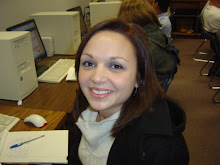

Randy Pausch Last Lecture:Achieving Your Childhood Dreams. This was a GREAT lecture. It was very inspirational. One of the podcasts that I watched for last weeks post was about this same lecture and just hearing the students from last semester talk about it was inspirational.
The way that the lecture was layed out was so organized. Everything was broken down with important points. The really important points were emphasized by being repeated throughout the lecture.
In this lecture, Randy Pausch spoke on three main points. These points being: Childhood dreams; enabling dreams of others; and lessons learned. On the first point, Randy Pausch talked about brickwalls, this was something he brought up more than once. Brickwalls are placed for those who really don't care to achieve their goals, those who keep going, this proves how badly we want things.
Another point that was made in the lecture was about people who are critical, critics still love you and care. Randy Pausch said that if you are doing something really wrong and nobody says anything or trys to correct you, they have lost hope in you so when someone is critical, this is a good thing. I really enjoyed how these points were thrown into the lecture, it made the whole lecture encouraging.
Also, Randy Pausch talked about what he learned from his childhood dreams, not only from the ones that he did accomplish but also from the ones he did not. He actually said that the dreams that he did not accomplish are the ones that taught him the most.
What really kept this lecture interesting were the many pictures. Randy Pausch had many pictures that really caught your attention because they were funny. While watching this last lecture, I had many emotions. I was sad for one because he knew that he had liver cancer and that he didn't have long to live, I was also amazed at the attitude that he had about it all, and I also learned some really mportant things that I hope to pass on to my own students one day.
This lecture can be viewed at Randy Pausch.
Also, if you would like to visit his homepage, it can be found at Randy Pausch home
The way that the lecture was layed out was so organized. Everything was broken down with important points. The really important points were emphasized by being repeated throughout the lecture.
In this lecture, Randy Pausch spoke on three main points. These points being: Childhood dreams; enabling dreams of others; and lessons learned. On the first point, Randy Pausch talked about brickwalls, this was something he brought up more than once. Brickwalls are placed for those who really don't care to achieve their goals, those who keep going, this proves how badly we want things.
Another point that was made in the lecture was about people who are critical, critics still love you and care. Randy Pausch said that if you are doing something really wrong and nobody says anything or trys to correct you, they have lost hope in you so when someone is critical, this is a good thing. I really enjoyed how these points were thrown into the lecture, it made the whole lecture encouraging.
Also, Randy Pausch talked about what he learned from his childhood dreams, not only from the ones that he did accomplish but also from the ones he did not. He actually said that the dreams that he did not accomplish are the ones that taught him the most.
What really kept this lecture interesting were the many pictures. Randy Pausch had many pictures that really caught your attention because they were funny. While watching this last lecture, I had many emotions. I was sad for one because he knew that he had liver cancer and that he didn't have long to live, I was also amazed at the attitude that he had about it all, and I also learned some really mportant things that I hope to pass on to my own students one day.
This lecture can be viewed at Randy Pausch.
Also, if you would like to visit his homepage, it can be found at Randy Pausch home


